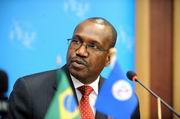Italia

Pubblichiamo di seguito l’intervento del Segretario Generale ITU, Hamadoun Touré, all’evento ‘Beyond Dubai: A New Global Agenda for the Internet’, organizzato da alleanza per internet e tenutosi a Roma nella Sala delle Conferenze internazionali del Ministero degli Affari Esteri.
Distinguished colleagues,
Ladies and gentlemen,
It is a great pleasure to be here with you in Rome today for this workshop entitled ‘Beyond Dubai – A New Global Agenda for the Internet’.
As you will know, the ITU’s mission is to connect the world, and to bring the benefits of ICTs to all the world’s people – wherever they live and whatever their circumstances.
This we do together with our 193 Member States and more than 700 sector members drawn from industry, academia and civil society organizations – including many of you here in this room.
I firmly believe that if we can succeed in achieving our mission, then we will see unprecedented social and economic improvement for all, and that we will continue to make bold steps in accelerating progress towards meeting the Millennium Development Goals – and indeed other sustainable development goals as we move forward.
Ladies and gentlemen,
We have made the most extraordinary progress in the first twelve years of the new Millennium.
In the year 2000, around half the people in the world’s richest countries had a mobile phone, and mobile penetration in Africa was under 2%.
Today there are some 6.4 billion mobile phone subscriptions globally, and mobile penetration in Africa has reached 60%.
At the beginning of the Millennium, around 280 million people used the Internet worldwide. In not much more than a decade that figure has grown almost ten-fold to reach just over a third of the world’s population.
And yet we still have a long way to go.
Because two thirds of the world’s people – some 4.5 billion people – are still offline.
This means that:
- Almost two thirds of the world’s people are still locked out of the world’s biggest and most valuable library.
- Almost two thirds of the world’s people are still refused access to the world’s biggest market place.
- And almost two thirds of the world’s people are still denied the extraordinary opportunities now available to the other third.
Mobile broadband is clearly going to be a vital part of the solution, and we must continue to mobilize to ensure that all the world’s people have affordable, equitable access to the Internet.
And that means finding the investment to continue rolling out the telecommunications infrastructure which makes access to the Internet possible.
Central to this is the crucial issue of spectrum. ITU’s membership already made some bold decisions during the World Radiocommunication Conference early last year which lay the foundations for ensuring that the digital dividend is used effectively for mobile broadband.
As we look ahead to WRC-15 we must seize the opportunities to ensure that operators have what they need to deliver mobile broadband and to deliver on our responsibility to connect all the world’s people.
This is why ITU and UNESCO set up the Broadband Commission for Digital Development three years ago – to advocate for increased broadband access and rollout globally; not just for its own sake, but to accelerate progress towards meeting the Millennium Development Goals.
We now have close to 60 Broadband Commissioners – all leaders in their field – representing governments, industry, academia and international agencies, and they are doing great work in advocating the importance of policy leadership. Indeed a number of our commissioners run some of the biggest and most influential companies in the mobile telecoms sector.
And it is great to see that Giancarlo Innocenzi Botti, one of our Broadband Commissioners, is one of the panelists at today’s workshop.
Distinguished colleagues,
ITU firmly believes in the social and economic benefits of improved connectivity for all – and in this regard I would like to celebrate some of the key achievements and highlights of the new ITRs which were agreed at WCIT-12 in Dubai in December.
The new treaty contains a number of important revised and new provisions that represent a major improvement over the 1988 text, so let me take a few minutes to go through it, article by article:
- In the preamble we find the affirmation of Member States’ commitment to implement the treaty in a manner that respects and upholds their human rights obligations; and the right of access of Member States to the international telecommunication services. It should be noted nonetheless that provisions of the ITU Convention and Constitution take precedence over the ITRs.
- Article 1 covers the scope of the ITRs – and I should draw your attention to two things here: firstly, that the ITR texts needed to be brought in line with the ITU Convention and Constitution, as these take precedence, and this is why changes were made to text concerning operating agencies; and secondly that our membership was clear about its intent that the ITRs should not address content, and this was therefore clearly specified in Article 1.1.
- Article 2, which covers definitions, was updated to bring the ITR definitions into alignment with the Convention and Constitution.
- Article 3, which covers several key issues such as quality of service, was revised to ensure the right to communicate at good technical quality; and that countries should coordinate how their infrastructure works: to prevent the misuse of international telecommunication numbering resources, to encourage the implementation of Calling Line Identification information, and to promote the implementation of regional telecommunication traffic exchange points.
These provisions should not only improve service quality but also help to bring down the cost of services to consumers.
Of course the more countries that accede to the new ITRs, the greater the benefits for all – and this is especially true in areas such as quality of service, where service quality outside a globally-agreed framework is only as good or bad as the weakest link.
- Article 4, which covers international telecommunication services, contains new provisions to improve transparency and accuracy in mobile roaming charges as well as promoting competition in the provision of mobile roaming services.
This will help to ensure: transparency of end-user prices for international mobile services; satisfactory quality; greater cooperation and competition to avoid ‘bill shock’; and the avoidance and mitigation of inadvertent roaming charges in border zones.
- Article 5 gives improved access to emergency services, which will translate directly into saved lives. The new Articles 5A and 5B, for their part, will help to bring greater security by promoting international cooperation to ensure the security and robustness of international telecommunication networks; and to promote measures – not based on content-filtering – that will help combat unsolicited bulk electronic communications, or spam.
As for quality of service, the more countries that accede to the treaty, the better the chances we have of achieving genuinely enhanced international cooperation at the global level, especially for issues of a clearly global nature, such as network security and spam.
- Article 6, which covers charging and accounting, will help to encourage investment in international telecommunication networks and promote competitive wholesale pricing for traffic carried. This is one of the most important articles in the revised ITRs and I am confident that it will play a very important role in furthering broadband rollout around the world.
- Article 7, which covers suspension of services, remains unchanged.
- Article 8, which covers the dissemination of information, includes new text to give Member States more flexibility in managing this according to national needs.
It also includes new Article 8A, which will help to improve energy efficiency and reduce e-waste, and new Article 8B, which will help bring the benefits of ICTs to the 650 million people worldwide who are living with some kind of disability.
As with many of the other new provisions, these articles demonstrate the clear emphasis that membership is now placing on human development and empowerment, and we should be proud to be part of a process which is actively working towards making the world a better place for all – through digital inclusion, respect for the environment and ongoing sustainability.
- Finally, Articles 9 and 10 cover special arrangements and the entry into force of the treaty.
The ITRs also contain five new Resolutions, which as you know do not require any ratification, acceptance or approval process, and are not inherently binding for Member States.
They are nonetheless important texts and will themselves help to bring improved access to ICTs to all the world’s people. Three in particular should be noted:
- We have a resolution on special measures for landlocked developing countries and small island developing states for access to international optical fibre networks – which will help bring services to some of the most underserved people on the planet.
- We have a resolution on the use of one of the globally harmonized national numbers for access to emergency services – which will help save lives in emergency situations.
- And we have a resolution on fostering an enabling environment for the greater growth of the Internet. This Resolution calls for greater broadband investment and expresses support for the multi-stakeholder model – goals that I believe we can all agree with.
Ladies and gentlemen,
To conclude, let me reiterate my conviction that thanks to WCIT-12, a healthy digital ecosystem – where everyone on the planet can participate – is now within our grasp.
All stakeholders, including governments and businesses, must do their utmost to ensure that we deliver on this promise.
As an institution, ITU has successfully been an influential and neutral global convener throughout its long history, and we are firm believers that only open, transparent and inclusive processes will lead the way to successful policy making.
This is why we continue to act as a bridge builder, promoting a multi-stakeholder approach to dealing with telecommunications and ICTs.
In this regard, I am very much looking forward to the fifth World Telecommunication/Information and Communication Technology Policy Forum, WTPF-13, which will be taking place in May.
WTPF-13 provides a global forum for our members to examine international Internet-related public policy matters, at their request – and let me stress here that WTPF is a forum, not a treaty-making conference.
The WTPF exists precisely so we can have a global debate on key issues in the world of ICTs. WTPF-13 is a unique opportunity to air the issues as they are seen among fellow experts, and the Forum will enable all stakeholders to contribute their unique perspective to the discussions and help the global community chart a common course forward.
The preparatory process towards WTPF-13 has been open and inclusive. It was led by an informal expert group that was open to all stakeholders, irrespective of whether or not they were members of ITU.
The expert group recently concluded its third and final meeting and approved six draft Opinions, by consensus, for further discussion at the Policy Forum in May. These include:
- Fostering an enabling environment for the greater growth and development of broadband connectivity;
- Promoting Internet Exchange Points (IXPs) as a long term solution to advance connectivity;
- Supporting multi-stakeholderism in Internet governance;
- Supporting operationalizing the enhanced cooperation process;
- Supporting capacity building for the deployment of IPv6; and
- Supporting IPv6 adoption and the transition from IPv4.
These opinions cover a wide range of Internet-related global public policy issues of significant relevance in today’s world – and I am confident that they will serve as a good basis for fruitful high-level discussions at WTPF-13.
Just before WTPF-13, on 13 May, we will be hosting a high-level Strategic Dialogue to discuss the importance of investment in infrastructure and the changing nature of ICT regulation.
The focus will be on broadband – the critical infrastructure essential for national competitiveness in today’s global economy – and I am sure that many of the issues we discuss here in Rome will form a key part of the inputs to that dialogue.
One of the crucial challenges is the surging growth of data which is putting unprecedented pressure on existing telecom networks. Governments and industry must work together to ensure that emerging business models ensure sufficient return on investments made on network upgrades.
So, the question then, is who pays for what? Whatever your view, one thing is for certain: this is a question worth asking and a question that requires answering. It is critical for all of us that the right balance be reached.
Some say the market will fix this; others are calling for a larger role for regulators to set a fair playing field – and this is exactly the kind of debate we will be having at the forthcoming Global Symposium for Regulators in Poland in July, when we will bring together regulators and industry leaders from around the world.
Distinguished colleagues,
To conclude, we all agree that broadband will be central to future social and economic development, and for many parts of the world this will be mobile broadband.
To realize this potential, old models need to be updated, and it has never been more urgent for us to work together to create the solutions to drive future broadband-enabled prosperity.
Thank you.
#beyondWCIT: lo Speciale di Key4biz












